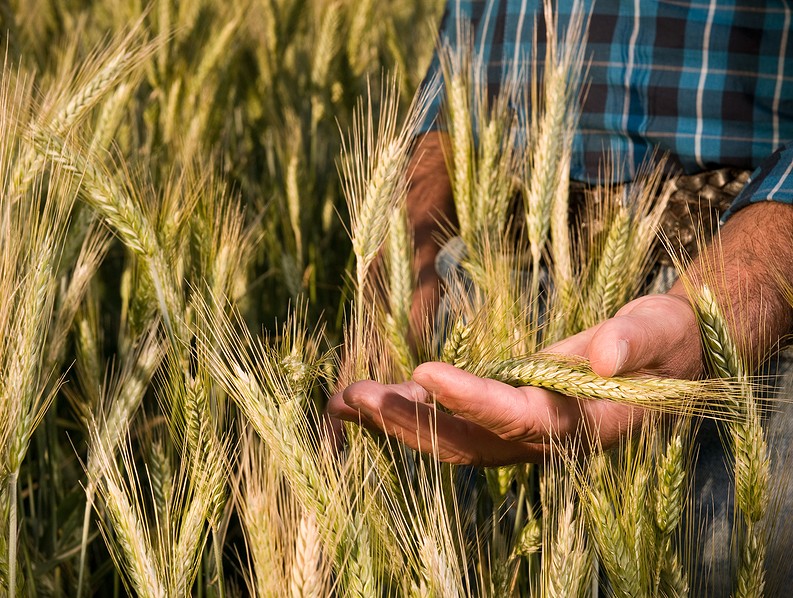News
NFU Summit Addresses Water Crisis Challenges For Farmers
The NFU held a summit at the end of last month (July 29th) to address the different challenges that farmers continue to face with national food production, focusing particularly on both water quality and water quantity.
Held on the Yorkshire farm of NFU vice-president Rachel Hallos, the summit was attended by over 60 delegates, including environmental secretary Steve Reed, water companies, industry experts, supply chain representatives and environmental non-governmental organisations.
Topics under discussion included climate change, unpredictable weather patterns, water pollution, regulatory financial pressures and how they’re evolving, and insufficient water infrastructure investment within the context of national food security implications.
This latter concern was one of the biggest talking points, with attendees emphasising the need for urgent investment in asset upgrades, as well as driving access to robust data and improved planning systems to support necessary infrastructure improvements on farm reservoirs and slurry storage.
In all, three key pledges were made relating to water quality and quantity:
Partnership working
Industry experts and regulators are to be brought together to develop and launch at scale nutrient management knowledge exchange and professional development. The aim here is to support water quality outcomes, as well as efficient and productive use of nutrients.
To achieve this, the NFU has said it will collaborate with regulators and planners on sustainable and resilient options for accessing water to deliver food security, as well as moving forward with work as part of the Rural Flood Resilience Partnership.
Advice & information
Here, the NFU has pledged to expand its water quality information to increase awareness of agricultural obligations, including case studies and best practice advice, signposting to funding schemes, rules and information on how to prepare for inspections.
It also said that it would be working regionally to support the establishment of water abstractor groups, communicating the future opportunities and risks for water demand, while protecting the natural environment.
Robust data
Here, the NFU has said it will support a pilot scheme to test out methodologies for farmers to see if it’s possible for them to carry out water quality testing themselves.
After the conference, Ms Hallos said: “Water is our most precious resource. It’s absolutely vital to producing the food our country needs. But we’re facing increasing pressures on water, be it resources, flooding, or quality.
“Whether it’s from vital nutrients that we use to grow food impacting water quality in rivers often from agricultural runoff or the cycle of drought and floods leading to poor harvests, it all undermines the stability and resilience of our farming businesses and ultimately impacts our food security.
“The knock-on effect is clearly highlighted in a survey of NFU members which reveals nearly two-thirds have experienced a severe weather event in the past ten years that has affected their farming business in some way.”
Water mismanagement
One issue that will need to be addressed if water stress and scarcity are to be tackled effectively by the agricultural industry is that of illegal abstraction, with recent BBC research revealing that over 150 farms across England have been found to be guilty of this since the middle of 2022.
Over-abstraction can cause significant harm to the environment, particularly if it takes place during drought conditions – which are only expected to become more frequent and more intense as time goes on, in line with climate change and rising global temperatures.
But it’s not just water abstraction that is problematic and water pollution is also a top concern for agricultural businesses.
Figures from the Environment Agency suggest that agricultural runoff is the biggest single polluter of rivers, accounting for 40 per cent of damage to waterways around the country.
The sector is also responsible for a large number of serious pollution incidents, as well as emitting the most ammonia into the environment. It is also not subject to progressive regulatory frameworks to recover costs.
As such, farmers and other agricultural organisations have a critical role to play in protecting the natural world, with 70 per cent of land across England used by the industry for food production.
Slurry and silage effluent cause the most serious pollution incidents, damaging local ecology and biodiversity, but diffuse pollution is also something to be mindful of, where rainfall washes soil, chemicals, pesticides, fertiliser, microplastics and farmyard waste/slurry into streams, rivers, lakes and the sea.
These combined pressures lead to biodiversity loss, as well as posing risks to human health, increasing water treatment costs and affecting fisheries, tourism and recreational businesses, thereby damaging local economies, as well.
What can farmers do to improve water quality/quantity?
Becoming more water efficient and sustainable as a farmer is achievable through strategies such as irrigation scheduling, drip irrigation, cover cropping mulching, greywater reuse, rainwater harvesting and other such measures to reduce over-abstraction and general consumption levels.
As for pollution, this can be addressed by adopting regenerative agricultural practices to improve soil health so that it holds and absorbs more water, as well as using cover crops over winter to reduce surface water runoff and soil erosion, reducing ploughing frequency, nutrient planning, fencing livestock away from waterbodies and so on.
However, a good place to begin is having a water audit of your site carried out so you can see how and where you use water. This will enable you to identify the best water-saving strategies for you and your farm. If you’d like to find out more, get in touch with the H2o Building Services team today.
